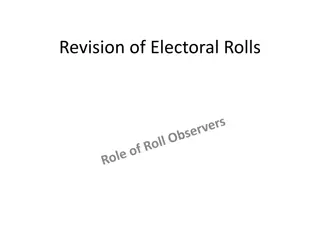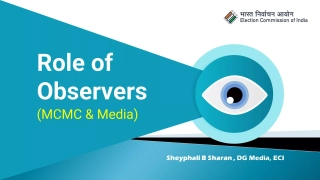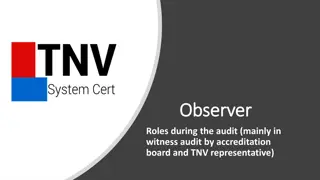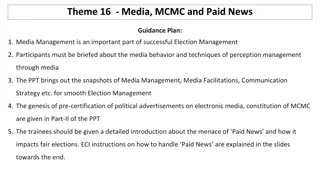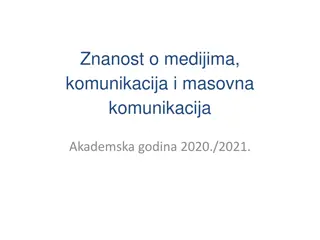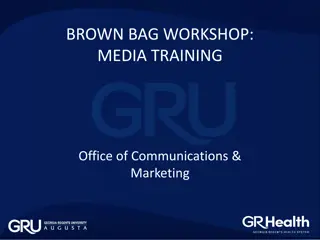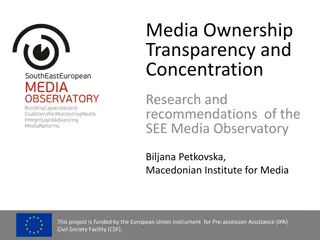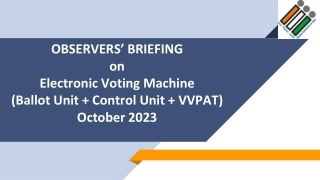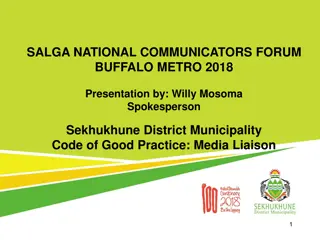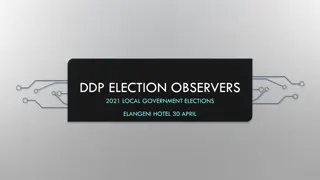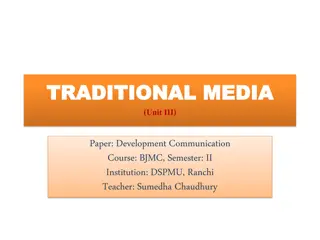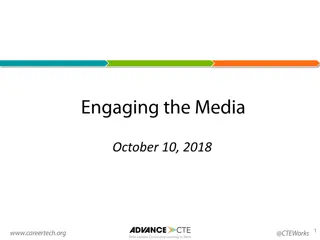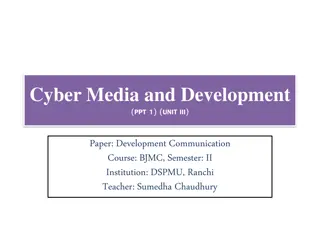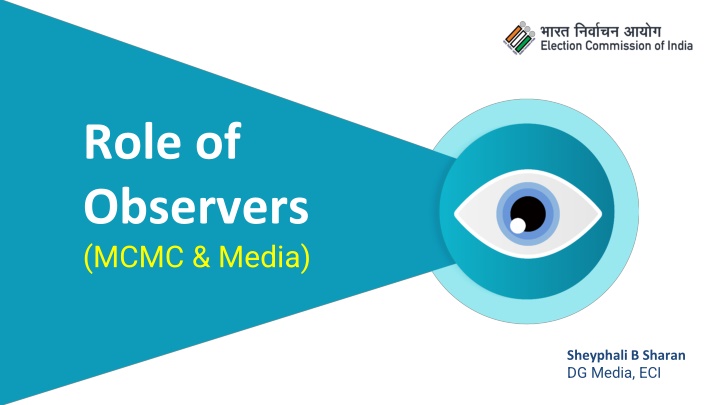
Role of Observers (MCMC & Media)
The role of observers in election management, focusing on their relationship with the media. It highlights the importance of media perception management and provides guidelines for observers to effectively observe and report on media-related issues during elections.
- election management
- perception management
- media reporting
- media certification
- paid news
- social media
Download Presentation

Please find below an Image/Link to download the presentation.
The content on the website is provided AS IS for your information and personal use only. It may not be sold, licensed, or shared on other websites without obtaining consent from the author. Download presentation by click this link. If you encounter any issues during the download, it is possible that the publisher has removed the file from their server.
E N D
Presentation Transcript
Role of Observers (MCMC & Media) Sheyphali B Sharan DG Media, ECI
Media in Elections Media is omnipresent. Commission treats media as an ally in election management - as its eyes and ears. Commission in fact facilitates the legitimate role of media in elections - Authority Letters are issued by Commission for Media to enter Polling Stations and Counting Centers. Election time is media s special time they are specially alert to pick up glitches, opine and spread message at lightning speed.
Key concerns 1. Apart from work done by Electoral Machinery, Perception Management equally crucial - Vital to Observe Media space/ Media Reporting too - can serve as helpful feedback of local issues. On arrival, meet with DEOs including the Nodal Officers of Media Cell for Media matters. (Teams to brief about Media Certification and Monitoring Committees pre-certification of political advertisements; Paid News matters; violation of MCC in media space - silence period; Social Media vigil - time bound action under VCE; virtual campaign issues; equitable sharing of air time on DD/AIR) Inputs from District Media Cell - clippings about elections and advertisements. 2. 3.
Your Role as Observers Observers are eyes and ears of the Commission, not the mouthpiece. Usually General Observer deputed at State HQ is member of State Level MCMC. Expenditure Observers to take special note of Paid News instances. To supervise that laid down procedures are followed. Avoid Press Meets, Press interaction and Press Statements. Guide most questions to the DEOs office ( As in list of DON Ts in your Manual.) Be Observant - see local media reports both electronic, print and social media , if necessary engage translators and call for extracts, vernacular press is particularly informative about local issues which may escape official channels.
Your Role as Observers CEOs sends two hourly action taken report on the media feedback on pre- poll and poll day to the Commission. Timely alerts/response/action taken for Take down requests esply on social media handles (as per laid down procedure by nodal officers) can curtail many a misinformation/ hate speech, fake news instances derailing electoral processes/ disrupt narratives Media Teams to function on FACT principle - Find, Assess, Create(Correct content) and Target(ed dissemination)
Media related Regulatory Provisions Section 126 (1) (b) of RP Act prohibits display to the public any election matter by means of cinematograph, television or other similar apparatus (includes social media) during the period of 48 hours ending with the hour fixed for conclusion of the poll in a Constituency. Opinion poll is also prohibited during this silence period. Exit poll is prohibited from Commencement of poll in 1stphase till Half hour of close of poll in last phase in all States. Section 127A of RP Act - The printing and publication of election pamphlets, posters, etc. is governed by its provisions, which makes it mandatory to bear on its face the names and addresses of the printer and the publisher. Section 171 (h)- of the IPC prohibits incurring of expenditure on advertisement without the authority of the contesting candidate.
MCMC Committees Media Certification and Monitoring Committees (MCMCs) are working at District Level and State level. These MCMCs have three sets of functions Pre Certification of Political advertisement in Electronic Media (including social media) Monitoring the media violation cases during election process Monitoring and action on Paid News cases
What is certification? Certifying political advertisement by MCMC (as per parameters/concerns* specified) before being telecast on electronic media including television channels and cable networks, social media and bulk SMS by any contesting candidate/ registered political party or by any group of organization/association or during elections. Political Advertisements in Print Media are to be pre-certified only on pre-poll and poll day *Listed with MCMC documents with DEO/CEO office
Jurisdiction of District and State MCMCs on Pre-Certification District Level MCMC pre-certifies political advertisements by Candidate. State Level MCMC ( Additional/Joint CEO level Committee) entertains the application for pre-certification received from all registered political parties with headquarters in State Capital ( Some national parties could be getting their ads pre-certified from Delhi) All grievances related to pre-certification of ads by District MCMC or State level MCMC (Additional/Joint CEO committee) rests with State level MCMC chaired by CEO.
Advertisements that require certification Advertisement on Cable Networks Advertisement on Radio/Private FM Channel Advertisement on TV Channels Audio Visual Displays of political advertisements/ campaign material in public places Advertisement on Social Media, Virtual Campaigns Advertisement on Cinema Halls Advertisements in e-papers of any newspapers Advertisements in newspapers on Poll & Pre-poll day Bulk SMS/Voice messages in political campaign
Paid News (1) Any news or analysis appearing in any media (Print and Electronic) for a price in cash or kind as consideration is Paid News. Paid News seeks to circumvent election expenditure laws/ ceiling, vitiates level playing field and causes undue influence on voters; also affects their Right to Information. Paid News to be monitored from period after nominations are finalised Where PCI have not nominated a member to the District MCMC, DEO will nominate a journalist/ independent citizen to the MCMC with the approval of CEO General/Expenditure Observer shall also bring to the notice of District MCMC any cases of paid news.
Paid News (2) RO will issue notice to candidates with a copy marked to Expenditure Observer on Paid News, on recommendation of the District MCMC asking why the expenditure on the suspected case of paid news should not be shown in candidate s account District MCMC shall consider and decide on cases of paid news on reply from the candidate to the RO s notice Appeals Procedure : Appeals on decision of District MCMC on Paid News shall lie with the State MCMC. Appeals against decision of State MCMC on paid news shall lie with Commission.
Paid News (3) MCMC Committee will work in close coordination with the accounting team for computing costs and also for reflecting expenditure in Shadow Expenditure Register. In cases finally decided by District MCMC as paid news, it will inform the Expenditure Observer and Accounting team for calculating the expenditure on Paid News at DIPR rate, (in absence of DIPR rate, DAVP rate shall be used) and further necessary action. Strict timelines exist to complete the Paid news action within election process Copies of notices on Paid News (in respect of candidates not media) shall be displayed on Notice Board of RO and DEO s website. Weekly report on Paid News is to be submitted by CEO to ECI
Paid News (4) Exaggerated publicity on TV Channels owned by Political Parties/Candidates shall come under purview of paid news mechanism. Lopsided news coverage, which actually means election publicity shall be assessed based on standard rate cards of channels/ newspapers, already collected by CEOs and such notional expenditure will be booked to the candidate. Instructions provide for accounting of politically biased news, irrespective of cash or kind consideration. PCI/NBDA has issued guidelines to be observed by journalists for election reporting, the same should be widely publicized. ECI also issues a Press note on Media related matters after announcement of the elections. CEOs/DEOs have been asked to take meeting with political parties and media houses separately at their level
Social Media (1) Information to be given by candidates about their social media accounts at the time of filing nominations. Pre-certification of Political advertisements on social media Expenditure on campaigning through internet including social media websites. Application of MCC to content on internet including social media. MCMC committee in Districts and States have one Social Media Expert.
Social Media (2) To oversee the implementation of regulations of Election Commission of India on social media and also to report any kind of violation/ hate content/ fake content circulating on social media. CEOs/DEOs to ensure timely identification & response for fake news/misinformation campaigns Major Social media platforms- FB, Google, Twitter have appointed dedicated grievance officer to take necessary and prompt action on the complaints of ECI related to the contents published on their platforms. Expenditure incurred in virtual campaigning to be included in the expenses accounts
Social Media strategy on FACT Asap principle F A C T A find, flag, track on real time basis analyse and decide next step of action C creat content...tailoring as per Requirement target dissemination of factually correct info ...depending on instance at deo/ceo/ECI level T
Voluntary Code of Ethics (since March 2019) In March 2019, major SMPs under aegis of IAMAI devised a VCE and committed to adhere with the same during elections for maintaining spirit of free and fair elections. Operative Part: 1. Valid legal orders wrt violations of Section 126 of RP Act 1951, will be acknowledged and /or processed within 3 hours of violations reported . A high priority reporting mechanism to ECI with appointment of a dedicated team. Nodal Officers appointed at ECI level to report violation cases to SMPs Facilitating transparency in paid political advertisement (only pre-certified ads will be shared on social media ) 2. 3. 4.



